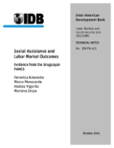Social Assistance and Labor Market Outcomes: Evidence from the Uruguayan PANES
Date
Sep 2011
This paper uses matched social security and program micro data from the Uruguayan Plan de Atención Nacional a la Emergencia Social to investigate the effect of social assistance on formal labor market outcomes. One specific feature of this program is that households could gain and retain eligibility only conditional on their formal income being below a predetermined level. Using a regression discontinuity estimator, we show that, consistent with a textbook model of labor supply, the program reduced formal employment and earnings, primarily among men. Although there is evidence of a modest rebound, by and large the adverse effects on formal labor supply and earnings persist even two years after the end of the program. We speculate that these long lasting effects are due to the dynamic incentives of entitlement for social assistance.



